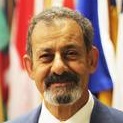By Bob Allen
A retired Southern Baptist missionary, whose attempts to evangelize Muslims in Middle Tennessee recently attracted attention in national media, died unexpectedly the day before Thanksgiving.
 Raouf Ghattas, 69, pastor of the Arabic Baptist Church in Murfreesboro, Tenn., the only Arabic-speaking church in the Tennessee Baptist Convention, died Nov. 25 after suffering a heart attack.
Raouf Ghattas, 69, pastor of the Arabic Baptist Church in Murfreesboro, Tenn., the only Arabic-speaking church in the Tennessee Baptist Convention, died Nov. 25 after suffering a heart attack.
A native of Cairo, Egypt, Ghattas and his wife, Carol, served 20 years with the Southern Baptist Convention International Mission Board as church planters and evangelists in Muslim communities in Turkey, Syria, Lebanon, Tunisia and Egypt.
When they retired in 2011 and moved back to Carol’s hometown, they found a different Murfreesboro than she remembered growing up, and a community divided over the construction of a mosque.
Declared a gateway city for Iraqi war refugees in 1992, the town’s Muslim population worshipped quietly for decades in an office building designated a mosque. That changed in 2010, when the county approved plans for a sprawling Islamic Center of Murfreesboro on 15 acres just outside the city limits.
After vandalism, bomb threats, legal challenges, a protest march and claims by a local politician it was a front for a terrorist training camp, the ICM finally got permission to occupy the building during Ramadan in August 2012.
In 2011 Ghattas began the Arabic Baptist Church in property offered by First Baptist Church in Murfreesboro, his wife’s home church, with a stated purpose: “To be a catalyst for all the Muslims of Murfreesboro to know Christ by equipping believers to effectively share their faith with Muslims.”
Invited by an interim pastor who had served as a trustee of the International Mission Board, the Arabic church relocated in 2013 to Grace Baptist Church, right next door to the mosque. The church had made news a year earlier by posting 13 white crosses on its lawn as a “message” to Muslims on their way to the new mosque.
The arrangement soured, and when a new pastor arrived Ghattas began looking for a different meeting place. The search ended in May with purchase of Scenic Drive Baptist Church, a congregation that after a split had dwindled to a handful of members struggling to meet expenses.
A May 30 Washington Post headline “One church’s sunset means a new day for another” presented the Arabic Baptist Church as a symbol of change going on in America’s Bible Belt.
“The first victims of Islam are the Muslims themselves,” Ghattas wrote in his final Facebook posting Nov. 24. “That profound truth will fill our hearts with love for Muslims and take the time and the effort to make them realize how they can be set free from the bondage of Islam only through the power of our Lord Jesus.”
A Murfreesboro Daily News Journal editorial memorialized Ghattas as a “builder of bridges,” who sought to get people to view Muslims not with fear but with Christian love.
“While some may not appreciate the concept of a Christian evangelizing to Muslims, Ghattas followed his heart and reached out to the local Middle Eastern population with kindness and respect,” news director Sandee Suitt wrote on behalf of The Daily News Journal editorial council. “Finally, regardless of whether one shares Ghattas’ religious convictions, we believe it is clear he followed his heart and sought to build understanding.”
Ossama Bahloul, the imam of the Islamic Center of Murfreesboro since 2008, told the Nashville Scene in July that he wasn’t overly concerned about potential converts inside his mosque.
“I think it’s fair to say that it’s difficult for people in general to change a belief,” Bahloul said. “People tend to experience and admire their own practice. If you are asking about the Muslim community in particular, I haven’t had any experience of someone coming to me, saying they want to experience a new religion.”
Born into an evangelical Presbyterian family, Ghattas graduated from Cairo University before immigrating to the United States in 1976. He worked 12 years as a nuclear engineer before entering Southwestern Baptist Theological Seminary and serving as pastor of Arabic Mission of University Baptist Church in Fort Worth, Texas, from 1985 until 1990.
After earning his M.Div. in 1990 Ghattas completed a D.Min. at Southwestern studying Muslim evangelism.
Then Carol Brown had served two years as a Southern Baptist journeyman in Ivory Coast before coming to seminary called as a missionary to an Arab country. She attended the Arabic church to develop her ministry skills. The couple met at church and were married in 1990. She received her M.Div. in 1991.
In 1992 Ghattas became the first Arab national to be appointed to the Middle East by what was then called the Southern Baptist Foreign Mission Board. They began their work in Lebanon, as soon as American missionaries were allowed back into the country where two dozen Southern Baptist missionaries left by order of the U.S. State Department in early 1987.
In addition to his wife, Ghattas is survived by two children, David and Nathan, five siblings and numerous nieces and nephews.
The Arabic Baptist Church canceled a Thanksgiving dinner due to his death but met for worship as scheduled on Sunday morning. Maged Boles, who had been an Anglican in Cairo before switching to Southern Baptist after meeting Ghattas, preached the sermon.
Previous stories:
Faith, fear clash in middle Tennessee over proposed mosque
